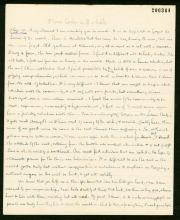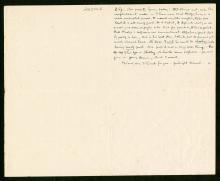BRACERS Record Detail for 19355
To access the original letter, email the Russell Archives.
"O My Dearest I am wanting you so much—it is so difficult to forget the horror of the world."
There are three typed versions of this letter.
Transcriptions of 1 September text: documents .052443, record 9916; and .201145, record 116134 (different typings).
Literary version, numbered 56, page 79, signed "L": document .052403, record 99869; and document .201166, record 116133 (ribbon copy and carbon). This literary version is much fuller than most of the other literary letters.
For archival purposes, since the letter on the verso was written a day later, a separate number .200344a was assigned to it. There are no transcriptions of it. It does not have its own BRACERS record.
Letter 91
BR TO CONSTANCE MALLESON, 1–2 SEPT. 1918
BRACERS 19355. ALS. McMaster
Previous Brixton letter, BRACERS 131572; next letter, BRACERS 19356
Edited by K. Blackwell, A. Bone, N. Griffin and S. Turcon
<Brixton Prison>1
1 Sep. ’18.
O my Dearest I am wanting you so much. It is so difficult to forget the horror of the world. There is knowledge that has come to one, during the war, that one can never forget. Old gentlemen at tribunals,2 every bit as cruel as a cat with a mouse. Envy and fear, the two great motive forces. I find it so difficult not to hate; and when I do not hate, I feel we few are so lonely in the world. Hate is still a human relation; but the only other attitude that I find possible towardsa the bulk of men and women is one of pitying comprehension, which removes me to such a terrible distance that I shiver from the cold of isolation. It is very difficult: I know that one ought to keep a vital relation with the community, and not only with one’s friends, but something seems destroyed, some connection severed. I feel the mass of the community to be cruel, rapacious, cowardly and hypocritical; I feel as if I could never again have a friendly relation with them. I can’t make myself believe in the Labour Party; it gets such strength as it has out of envy of the rich, and would gladly harm them even if no good were to come to the rest through their suffering. So, although politics may be better or worse, I can never again make them a vehicle for ideals.3 But I dread the attitude of the sect, retiring from the battle into mutual admiration and a set of soft lies in which virility is smothered. One must find activities that are rooted in the hope of ultimate power for the things one believes in. It is difficult to see the evil in the world quite truly but without exaggeration or melodrama or emphasis on tragedy, without anger or the wish to hurt, and yet not coldly.
You know that you help me in this. You know that when I can hold your hand, when I am warmed by your companionship, I can look steadily at things that hurt, see them as they are, and learn how to live with them, resisting but not mad. My part, I know, is to make as many people as possible see truly how they live and what the world is. And for this, as for everything, I need your love.
2 Sp.b One month from today! All things end, even the unpleasant ones. — I have now read “Madge”,4, c being in a more controlled mood. It moved me, like everything Miles does. But it is not really good. It is dated, it depends wholly on its moral; as soon as people take that for granted, it has no point. And Madge’s sufferings are conventional. Miles has a great deal of poetry in him; that is his best item, I think, but it doesn’t get much chance here. Oh dear, I wish he could be shaken into being really good. One feels it such a very near thing. — The tip-top of his type is Shelley,5 who has the same softness. — You never gave me Young Heaven,6 which I want.
My lovely one I thirst for you. Goodnight Beloved.
B.
- 1
[document] The letter was edited from the initialled, twice-folded sheet in BR’s hand in the Malleson papers in the Russell Archives. The 2 September portion is all that was written on the verso of the sheet, and in fact entirely within a single quarter when folded.
- 2
tribunals Young C.O.s had to plead their cases before people who were too old to be conscripted.
- 3
I can’t … believe in the Labour Party … vehicle for ideals In “The German Peace Offer”, the article for which BR was imprisoned, he still felt able to proclaim that “Labour holds the key. It can if it chooses secure a just and lasting peace within a month, but if this opportunity is allowed to pass by, all that we hold dear will be swallowed up in universal ruin” (The Tribunal, no. 90 [3 Jan. 1918]: 1; Auto. 2: 79–81; 92 in Papers 14). Although welcoming Labour’s (belated) embrace of a foreign policy in close alignment with his own desire for a negotiated peace, he remained suspicious of a political organization dominated by a trade-union leadership committed first and foremost to furthering the sectional interests of its working-class members. “Something broader and more constructive is needed”, he wrote in Political Ideals (New York: Century, 1917; Papers 14: 231), than the narrow pursuit of material gain out of what he saw as class hatred and envy. But the guild socialist programme that was BR’s preferred solution (with its projected democratization of industry, for example) held little appeal for trade-union bosses. When BR joined the Independent Labour Party in July 1917, he did so advisedly because this affiliated organization was strongly anti-war and far more committed than the parent body to transforming capitalist society along socialist lines. For all his dissatisfaction with the Labour Party, however, BR twice stood as a parliamentary candidate for it and remained a loyal, if hardly uncritical, member until resigning in 1965 over the Wilson Government’s support of the US in the Vietnam War.
- 4
read “Madge”The play by Miles Malleson that Colette had sent BR in which she was to play the title role for the Experimental Theatre. “Madge” was never published, at any rate under that title. Earlier (in Letter 72) BR had been too upset by it to continue reading the play.
- 5
The tip-top of his type isShelley Percy Bysshe Shelley (1792–1822) was a favourite poet of Colette and BR; he had read Epipsychidion (1821) to Colette at Ashford (S. Turcon, “Then and Now: Bertie and Colette’s Escapes to the Peak District and Welsh Borderlands”, Russell 34 [2014]: 117–30), and also to his first fiancée, Alys Pearsall Smith (Auto. 1: 83). The anonymous Times obituary of Miles Malleson remarked that “as a writer his power was inadequate to express his vision of things, which was that of a Shelleyan idealist” (17 March 1969, p. 10).
- 6
Young Heaven A play by Miles Malleson, published by Allen & Unwin in 1918; Colette played Daphne in it when it was staged in September 1919.
- 7
More later in the book. “The book” refers to one of the camouflage books with uncut pages used to smuggle letters into and out of the prison. None of the letters (or possibly other documents) referred to here could be identified.


